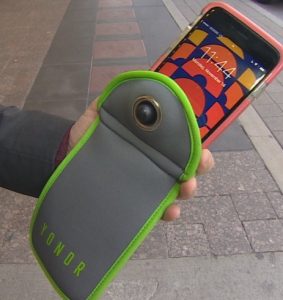For fans of music, attending a concert to see an artist or band perform is part of the overall experience. Say, your favorite band announces a new album in the works. After months of anticipation, the album roll-out happens. There are radio show interviews and meet and greets. You get a release date on when the album drops and finally, the tour dates are announced. You call your friends, who enjoy your company as you do theirs and with whom you share a common taste in music, to join you when the date arrives. You wait for more information on ticket sales and things fall in your favor. You and your friends score tickets to the concert.

The day arrives and you find out the band requested Yondr to meet their wishes for a phone-free environment during the show. You are handed a pouch, the size of your cell phone, to place your device in. Once inside, the case will lock, but you will maintain possession of your phone at all times. The locking device is similar to a security tag at a clothing store. If you need to use your phone, you may either wait until after the show is over or leave the concert and walk to any of the unlocking bases, which are located away from the main venue and near the exits.
You and your friends are in disbelief. You planned on taking pictures. You planned to record your favorite songs as they perform it live. You planned to document the moment and keep it forever. On the other hand, not having the use of your smartphone forces you to give your undivided attention to show, rather than the bright light of your phone, checking Facebook or Twitter. You are forced to live in the moment.
The concert is over; you receive the use of your phones back, by unlocking them at an exit station. You and your friends enjoyed the performance, which was even better than you expected. All of the sudden, you realize you feel cheated out of the opportunity to recapture it at will. You feel gypped out of your free souvenirs in the forms of photos and videos, not to mention bragging rights via live tweets and Instagram.
As emotions settle down, you think about your experience and start questioning if not having a cell phone with the ability to capture your favorite moments was robbed from you. Record labels and music executives may sleep better without the fear of copyright material going viral online, as labels like to be in total control of the artist band’s merchandise, sales, appearances,

and the way content is being distributed, but you feel ripped off.
Musicians and comedians such as Jack White, Bonnie Raitt, Alicia Keys, Bob Dylan, Dave Chappelle, Tracy Morgan and Chris Rock have been asking fans to put their cell phones away during live performances, some by physically removing fans who fail to comply. Others are relying on the technology to force compliance. This new technology is called Yondr.
Yondr is an American company founded in 2014 by Graham Dugoni. This new tech company will be providing phone-free environments with a soft pouch that the person puts their cell phone inside. The pouch locks for the duration of the performance or speaker. Dugoni said Yondr’s focus is to provide the best experience possible in spaces where one’s full attention is appreciated by the performer or speaker. Yondr is now being used at concerts, comedy shows, schools, courts and more.
Recent articles, such as in the Rolling Stone, quoted Bonnie Raitt defending her decision to create a phone-free environment by using Yondr during her concerts as saying, “It’s like a sacred space between me and the audience.”
Not all artists agree with a phone-free environment. There are artists who see cell phone usage as a way to promote the artist on social media by taking clips of concerts and posting them. This can generate more exposure and sales for the artists by simply allowing this to happen. Some artists even use the light of cell phones as part of the show.
Performers with younger audiences, such as Justin Timberlake or Drake, consider smartphones a smart marketing tool resulting in YouTube videos and social media posts. By allowing this, the artist does not pay for this extra marketing.
This may be the beginning of the future for concerts. Unless the public speaks out and rebels against the idea by not showing up to Yondr events and concerts, these guidelines will be considered a standard sooner rather than later. If that happens, you might as well leave your phone at home.

